When the economy slows down many of us want to keep our cars longer. Is it possible? What will it take? How to make your vehicle's engine and transmission last longer?
I had many cars and maintained all of them myself. I also worked as a mechanic and a used car inspector, so I know very well why cars break down. Here are few tips from my experience.
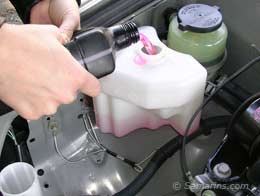
- Keep all the fluids clean and topped up. All fluids are vital for your car and over time they evaporate, leak and lose their qualities, so change as needed and top up when the level is low.
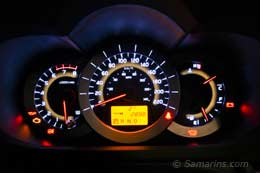
- Pay attention to your car's instrument panel. Any warning light like "
Check Engine" "Low oil pressure" or "Brake warning light" comes on while driving? Have it looked at as soon as you can. Notice the engine temperature rises higher than normal? - have the problem diagnosed before the engine overheats.
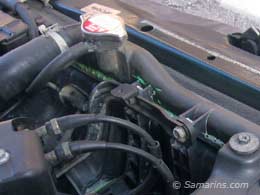
- Watch for early signs of potential problems. Leaks, irregular noises, difference in the engine performance, occasional sputtering, grease splattered on the wheels, different feel of the brake pedal - these are the types of early signs that indicate a problem that needs to be taken care of. Deal with the problems as they appear, before they get worse. I can give you hundreds of examples where a small problem can lead to major repairs if not repaired in time.

- Find a good trusted and knowledgeable mechanic to take care of your car. Ask your friends for recommendations. At least once a year have your car checked out in a repair shop. There are plenty of things underneath the car that only can be checked when the car is lifted up on the hoist.
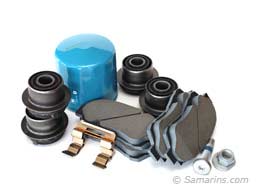
- Use only known good quality or original parts. I also can give you many examples where using poor quality parts led to more problems and more repairs. When I bough my last car (used) it had fairly new aftermarket brake pads installed. I had problems with hard brake pedal, pulsating brakes and squeaking noise until I replaced the brake pads with original parts. Yes, there are plenty of good aftermarket parts on the market, but if you don't know which one is good and which one is not, the safe bet is to go with the original.
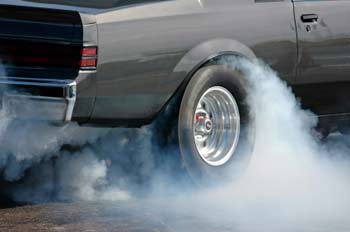
- Drive smoothly. The full-throttle acceleration will cause many parts of your car to wear faster. The same with the hard braking. If your daily commute involves only short trips, take your car on a highway once in a while. Driving only short trips without letting the car to warm up fully is hard on your engine. If it's a new car, have it broken in properly, so it will last longer. Check your owner's manual how to break in a new vehicle.
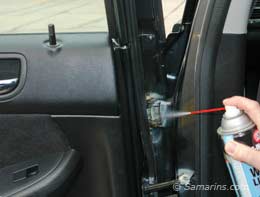
- Regularly lubricate door hinges and locks, as well as the hood, trunk lid or tailgate hinges and locks. Without lubrication the hinges will corrode and wear out fast. If you have a minivan, clean and lubricate the sliding door rails as well.
- Rustproof your car body if you live in the rust belt area. When there is constant humidity and salt on the roads during winter season it's hard to prevent corrosion. If your vehicle has been rust proofed, there is a better chance that your car won't get corroded in a few years. The rustproofing also protects the electric wiring underneath the car.

- Wash your car regularly as the corrosion starts in the dirty areas, where the moisture accumulates. If the car is clean, it dries up faster. If you wash your car at a coin car wash station as I do, spray the car with the pressure wax as a last step. Wax your car once in a while - this will keep the paint finish looking shiny longer. The wax also protects the body panels from corrosion.
How to wax a car
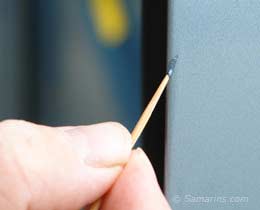
- Touch up the stone chips, scuffs and scratches in the car paint before they get corroded. Once the bare metal inside the scratch is exposed, it will rust, and it will be a lot bigger repair to fix corroded spots.
How to touch up paint chips
How to repair scratches
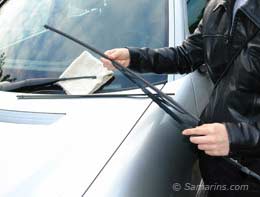
- Clean the the windshield wipers regularly, when you wash your car, make sure to wash under the wipers. Often small particles of sand get trapped under the wipers and when you turn them on your windshield gets scratched. Those are small scratches, but they will cause that annoying glare when driving at night. If you see the wiper rubber splits at the edges, change the wipers, because once the rubber disintegrates, the metal part of the wiper will scratch the windshield. Replace windshield wipers at least once a year. You can just replace rubber parts of the wipers called refills. They can be purchased from your dealer.
- Clean the leaves that accumulate under the windshield on the cowl panel. If left there, they would fall inside the cowl panel and accumulate moisture causing corrosion.
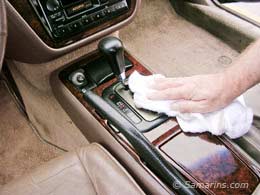
- Keep the interior of your car clean and dry. If any water gets spilled on the floor, dry it up quickly. There is a whole lot of wires and some other electronics under the carpet, and when the water gets there, those wires tend to rust. Similarly, if you notice the rain water gets inside, fix the leak before too much stuff got corroded. When you clean the car interior, use a barely moist towel as water can also get into some electronics; the same with the spilt coffee.
How to clean car interior
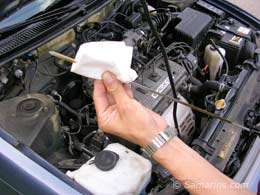
- Check the engine oil regularly and change it as often as recommended - this will keep your engine running. It's best to use a good quality oil. If you don't trust the oil from your oil change place, use the engine oil from sealed containers. This way you will know what you are getting inside your engine.
How to check the engine oil
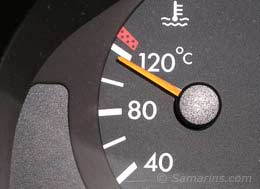
- Keep your engine from overheating. When the engine overheats, there is a lot of things that can go wrong from seals and gaskets to piston rings and the cylinder heads. Check the engine coolant level regularly. If you notice that the engine temperature rises more than usual, take care of the problem as soon as you can. If you notice that the coolant level drops, have your cooling system checked for leaks. If enough coolant leaks out, the engine will overheat. For the same reason, keep the front of your car's radiator unobstructed, so the air can flow freely to cool the coolant in the radiator.
Change the spark plugs at recommended intervals. Spark plugs wear out and a worn spark plug can cause the ignition coil failures.
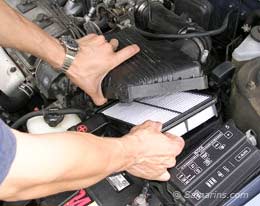
Change the air filter regularly, an old air filter can rip through and unfiltered air can enter the engine. The dirt and sand particles coming with unfiltered air can damage a lot of things including the airflow sensor, cylinder walls, pistons, etc. When you replace the air filter, make sure it is installed properly for the same reason.
You transmission is another part that will be expensive to fix if it fails. The automatic transmission mostly fails from overheating. Over time and under the excessive heat the transmission fluid loses its lubricating qualities and the transmission starts to wear faster, so change the transmission fluid as recommended. Consider using synthetic transmission fluid if it's suitable for your vehicle - the synthetic transmission fluid lasts longer. If you towing a trailer, consider installing an additional transmission fluid cooler and change the transmission fluid more often. Again, drive smoothly.
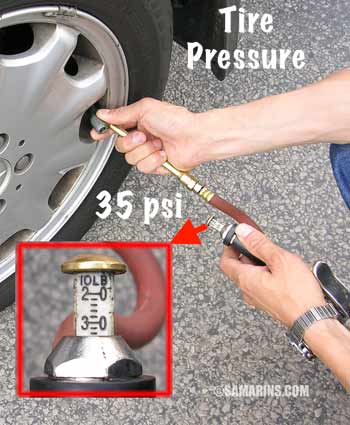
Check tire pressure regularly as under-inflated tires wear faster and will cause poor fuel economy. Uneven tire pressure will cause the 4WD system to wear faster. Over-inflated tires cause the suspension and steering components to wear faster. Change winter tires back to all-seasons after the last blast of winter, because many winter tires wear faster on dry asphalt. If you notice that the tires wear unevenly, have the wheel alignment checked. Improper wheel alignment also causes increased wear of suspension and steering components.
Don't keep the heavy load in your car if you don't need it. If your car is sitting in a garage with a lot of heavy stuff in the back, the coil springs in the rear suspension are getting tired and sag.
http://www.samarins.com


 - Watch for early signs of potential problems. Leaks, irregular noises, difference in the engine performance, occasional sputtering, grease splattered on the wheels, different feel of the brake pedal - these are the types of early signs that indicate a problem that needs to be taken care of. Deal with the problems as they appear, before they get worse. I can give you hundreds of examples where a small problem can lead to major repairs if not repaired in time.
- Watch for early signs of potential problems. Leaks, irregular noises, difference in the engine performance, occasional sputtering, grease splattered on the wheels, different feel of the brake pedal - these are the types of early signs that indicate a problem that needs to be taken care of. Deal with the problems as they appear, before they get worse. I can give you hundreds of examples where a small problem can lead to major repairs if not repaired in time.
 - Use only known good quality or original parts. I also can give you many examples where using poor quality parts led to more problems and more repairs. When I bough my last car (used) it had fairly new aftermarket brake pads installed. I had problems with hard brake pedal, pulsating brakes and squeaking noise until I replaced the brake pads with original parts. Yes, there are plenty of good aftermarket parts on the market, but if you don't know which one is good and which one is not, the safe bet is to go with the original.
- Use only known good quality or original parts. I also can give you many examples where using poor quality parts led to more problems and more repairs. When I bough my last car (used) it had fairly new aftermarket brake pads installed. I had problems with hard brake pedal, pulsating brakes and squeaking noise until I replaced the brake pads with original parts. Yes, there are plenty of good aftermarket parts on the market, but if you don't know which one is good and which one is not, the safe bet is to go with the original.  - Drive smoothly. The full-throttle acceleration will cause many parts of your car to wear faster. The same with the hard braking. If your daily commute involves only short trips, take your car on a highway once in a while. Driving only short trips without letting the car to warm up fully is hard on your engine. If it's a new car, have it broken in properly, so it will last longer. Check your owner's manual how to break in a new vehicle.
- Drive smoothly. The full-throttle acceleration will cause many parts of your car to wear faster. The same with the hard braking. If your daily commute involves only short trips, take your car on a highway once in a while. Driving only short trips without letting the car to warm up fully is hard on your engine. If it's a new car, have it broken in properly, so it will last longer. Check your owner's manual how to break in a new vehicle. 


 - Clean the the windshield wipers regularly, when you wash your car, make sure to wash under the wipers. Often small particles of sand get trapped under the wipers and when you turn them on your windshield gets scratched. Those are small scratches, but they will cause that annoying glare when driving at night. If you see the wiper rubber splits at the edges, change the wipers, because once the rubber disintegrates, the metal part of the wiper will scratch the windshield. Replace windshield wipers at least once a year. You can just replace rubber parts of the wipers called refills. They can be purchased from your dealer.
- Clean the the windshield wipers regularly, when you wash your car, make sure to wash under the wipers. Often small particles of sand get trapped under the wipers and when you turn them on your windshield gets scratched. Those are small scratches, but they will cause that annoying glare when driving at night. If you see the wiper rubber splits at the edges, change the wipers, because once the rubber disintegrates, the metal part of the wiper will scratch the windshield. Replace windshield wipers at least once a year. You can just replace rubber parts of the wipers called refills. They can be purchased from your dealer.

 - Keep your engine from overheating. When the engine overheats, there is a lot of things that can go wrong from seals and gaskets to piston rings and the cylinder heads. Check the engine coolant level regularly. If you notice that the engine temperature rises more than usual, take care of the problem as soon as you can. If you notice that the coolant level drops, have your cooling system checked for leaks. If enough coolant leaks out, the engine will overheat. For the same reason, keep the front of your car's radiator unobstructed, so the air can flow freely to cool the coolant in the radiator.
- Keep your engine from overheating. When the engine overheats, there is a lot of things that can go wrong from seals and gaskets to piston rings and the cylinder heads. Check the engine coolant level regularly. If you notice that the engine temperature rises more than usual, take care of the problem as soon as you can. If you notice that the coolant level drops, have your cooling system checked for leaks. If enough coolant leaks out, the engine will overheat. For the same reason, keep the front of your car's radiator unobstructed, so the air can flow freely to cool the coolant in the radiator.
 Check tire pressure regularly as under-inflated tires wear faster and will cause poor fuel economy. Uneven tire pressure will cause the 4WD system to wear faster. Over-inflated tires cause the suspension and steering components to wear faster. Change winter tires back to all-seasons after the last blast of winter, because many winter tires wear faster on dry asphalt. If you notice that the tires wear unevenly, have the wheel alignment checked. Improper wheel alignment also causes increased wear of suspension and steering components.
Check tire pressure regularly as under-inflated tires wear faster and will cause poor fuel economy. Uneven tire pressure will cause the 4WD system to wear faster. Over-inflated tires cause the suspension and steering components to wear faster. Change winter tires back to all-seasons after the last blast of winter, because many winter tires wear faster on dry asphalt. If you notice that the tires wear unevenly, have the wheel alignment checked. Improper wheel alignment also causes increased wear of suspension and steering components. 